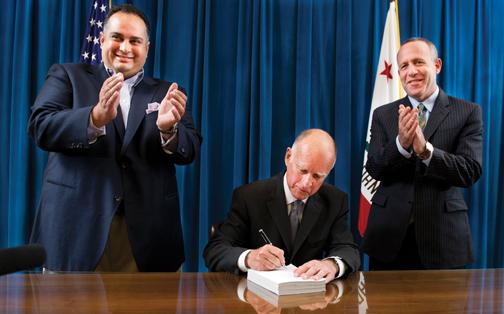
AB 1844 and SB 1349
California Gov. Jerry Brown announced the signing of two bills, which will limit potential employers and universities’ access to the profiles of social media users.
“The Golden State is pioneering the social media revolution and these laws will protect all Californians from unwarranted invasions of their personal social media accounts,” Brown said in a prepared statement
after announcing his signature. Assembly Bill 1844, sponsored by Nora Campos, restricts employer access to employees’ and applicants’ social media passwords and usernames. It is also illegal for employers to fire or punish employees who refuse to divulge social media information. The bill does not impede employers to
investigate workplace misconduct. A similar bill, Senate Bill 1349, sponsored by Leland Yee, protects students’ social media accounts from public and private universities and colleges. Brown expressed that this bill would help prevent “universities from snooping into students’ social media accounts, particularly those of student athletes.” The bill does not take away the schools’ right to punish and investigate student misconduct.
Social media marketing intern at Thunder SEO and media studies senior Kelly Kauffman believes social media is an emerging platform and that it’s necessary to set preliminary boundaries.
“It is important to maintain social media as an honorable thing before people start getting too cautious of how they use it for fear of what employers will think,” Kauffman said. According to section 1 of AB
1844, social media encompasses all electronic content, including, “blogs, video blogs, podcast, text messages, email or online services, or Internet web site profiles.”
The term “social media,” according to the bills, is a vague term, which may lead to different interpretations. Still, employers are allowed to demand employees usernames and passwords for business-related social media accounts.
Kauffman, who has worked as a social media intern for both Thunder SEO and Meals on Wheels, considers these bills an imperative step in creating respectful and honorable social media usage.
-Ana Ceballos, Assistant News Editor
AB 970
If students can’t avoid fee increases, at least they can now avoid the element of surprise.
Compliant with Assembly Bill 970, the Working Families Student Fee Transparency and Accountability Act, which Gov. Jerry Brown signed on Sept. 27, a tuition increase for California State University and University of California students will not
go into effect until 90 days after approval, in order to give students a chance to prepare accordingly.
Effective Jan. 1, AB 970 will require the UC and CSU to provide justification for a fee increase, information on how the allotted funds will be used, a description of what alternative options considered and the fee’s potential impacts on students. The bill requires students to be notified 30 days prior before it goes into effect.
In addition, universities cannot approve the fee until 45 days after holding a public meeting to discuss the tuition increase.
“This is a big victory for every student paying tuition at a California public university,” California State Student Association President David Allison said.
Criminal justice sophomore Miguel Mendez, who works 20 hours a week to pay for his student loans, said the bill will give students more time to budget their money and plan ahead. “I think it will help a majority, if not all, university students,” Mendez said.
-Stacey Oparnica, Staff Writer







